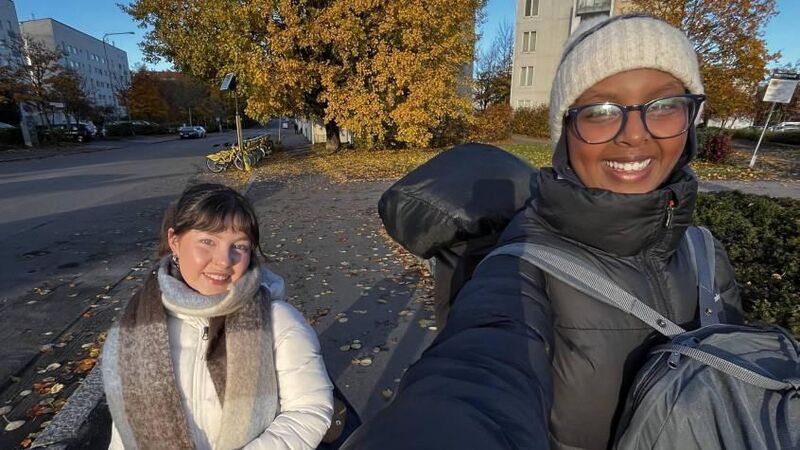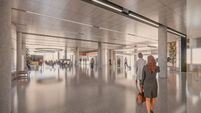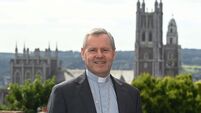Cork Views: Students gather to discuss future of planet

UCC Law students Amy O’Brien and Sumaya Mohammed, who attended the Planetary Health Academy event held in Finland
I was honoured to have the opportunity to spend a week recently in Helsinki, Finland, participating in a Planetary Health Academy, an intensive week of lectures, workshops, lessons and activities revolving around climate change.
Themes included how human activities are causing the crisis, the impact these consequences are having on communities, the psychological benefits of nature on our wellbeing, and finally, the complexities, system change and system thinking involved in the issue.
I travelled with Sumaya Mohammed, a fellow Law student also representing UCC. The week was funded by Erasmus+ and held at DIAK University in Helsinki.
Planetary Health is a field of study, as well as a global movement, that strives to link the health of humans with the health of natural systems. Humanity depends on the natural world, but rather than exploiting its valuable resources, we need to start implementing sustainable solutions and living harmoniously with it.
Planetary Health focuses on how human activities are disrupting Earth’s natural systems with devastating consequences, such as climate change, biodiversity loss, deforestation and pollution - all of which are damaging human health. The aim is to address these problems through an interdisciplinary approach and intersectional lens.
In essence, it involves advocating for sustainable, equitable transformations in political, economic, and social systems to safeguard the health of our planet and its people.
The first day of the Planetary Health event centred on learning about how the climate crisis was caused, and the impact it’s having. We learned this, not through traditional lecture sessions, but through playing a facilitated Climate Fresk - a methodology developed by scientists that aims to explain the crisis and the systemic nature of its challenges.
The Fresk required all participants to be participative learners. By the end of the activity, we could see the entire picture leading to where we are at this moment in time.
I found this task really engaging and a great way to get to see my group’s varying perspectives, depending on what degree they’re studying, where they’re from, and so on.
The game was primarily educating participants on the science of climate change which I found more challenging and really beneficial.
As I am studying law and my environmentalism is mainly based on advocacy, it was interesting to learn more about the science behind climate-related issues as reported on by the IPCC (Intergovernmental Panel on Climate Change).
After lunch, we explored the role humans have played in both the sources and solutions of environmental degradation.
After the first day in DIAK we had the chance to get to know the students from other universities over tea and coffee. They were from Malaysia, Kenya, Austria, Germany, Norway, Cameron and, of course, Finland.
On the second day, Annalisa Setti, a senior lecturer and cognitive scientist at UCC, gave a lecture on the positive psychological impacts of nature on wellbeing. Her psychology background brought an interesting, fresh perspective to our environmentalism discussions.
She told us about different studies that have been conducted, proving that time in nature heightens our sense of wellbeing. She challenged us to consider how policies could be developed to ensure people in our communities are provided with biodiverse natural spaces.
We then discussed the myriad of ways we feel connected to nature, such as engaging in environmental activism, admiring nature’s beauty, emotional regulation, taking part in activities in nature, e.g. hiking or kayaking in nature, and so on. It was interesting to hear how other students’ opinions on this differed depending on their natural landscapes.
Prompted by the lectures, I took time to reflect on how I feel when I’m in the woods near Mitchelstown or walking along the beaches lining West Cork.
On the third day, Sumaya and I explored Helsinki and completed our group work.
Day four began with an interactive exercise that involved all students and lecturers, facilitated by an Economics lecturer and designed to demonstrate the ways in which people began to depend and rely on systems. His subsequent lecture touched on how systems operate and how people act within them.
We then learned about two different case studies, one from a lecturer from Norway, the other, from the Philippines.
The first focused on Norway where the government wants to put windmills on land where indigenous people, Sawi people, live.
The second case study revolved around the impact of mining in the Philippines.
As students, we were encouraged to learn more about these topics and work in teams to map out the complexities in both cases.
For example, in the first case, we had to weigh up the indigenous people’s land rights with the need for widespread and affordable renewable energy in Finland. In the latter, it was similarly important to recognise the challenging nuances at play. For example, the need for materials to run our technology.
Each group created a big map to visually display these complexities, then presented their findings to the entire class of students.
I found this the most interesting day of learning, content-wise. I’m glad I was made to think critically, to embrace nuance and to develop my own opinions, whilst practising active listening skills and absorbing the perspectives of students who come from all different areas of the globe.
On the final day of the Planetary Health Academy, we were asked to consider what our preferred futures would look like. Each group was given a theme or aspect of society to focus on, i.e. transport, nutrition, housing, etc.
My group was instructed to imagine what healthcare would be like in a utopian future. Luckily, a girl in our group was studying Healthcare Systems in Germany. She had fascinating ideas on how we can make healthcare more accessible to people, with a focus on community-based care and preventative work.
Our group also drew on everything we had encountered and learned that week. We realised that connectivity with nature was vitally important for a holistic approach to healthcare, especially in relation to preventative action for our mental health.
I loved seeing each group’s take on their theme, highlighting the sustainable solutions they envision for a preferred future.
As a finishing touch, we asked each student in our project to write ‘welcome’ in their native language. The complete board represented a hopeful future that is inclusive and respectful of diversity, and it was very special to see ‘fáilte’ among all the other welcomes.
The entire experience reaffirmed my passion for working to a more sustainable future, and taught me the importance of thinking critically about how different issues and sectors of society intersect. It has taught me the need for an interdisciplinary approach to my climate justice advocacy. Furthermore, I’m reminded of the power of using our voices, listening to one another and coming together in communities to create change.







 App?
App?




